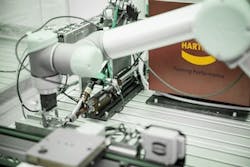Increasing digitalization and networking are also changing production and delivery processes in the industrial context. Industry is evolving into Integrated Industry on the basis of Internet technology. Unlike the three previous industrial revolutions that paved the way for mass production, this fourth industrial revolution is enabling concrete customized production for customers, even for one-unit lots.
But how will Integrated Industry develop in the coming years? We have analyzed the six fundamental trends that are crucial for Integrated Industry: Modularization, identification, integration, digitalization, miniaturization and customization.
A further important trend that we have seen in many talks with our customers is integration. The end-to-end production process structure requires consistent vertical integration of the field level and corporate management. System integrators combine Smart Objects and ERP with flexible software solutions.
The digitalization trend is also gaining in importance. The advancing digitalization of industrial manufacturing requires a constant increase in intelligent hardware at the field level. Modular systems support the company in the distributed collection and evaluation of data. Step by step, actual production and IT applications are growing more closely together.
This digitalization of industrial production requires constantly increasing computing power at more points of use and in a more and more compact area. Components and customized solutions deliver maximum performance in a minimum size (miniaturization). And finally, industrial manufacturing is becoming more and more intelligent and flexible. Companies are demanding solutions that match their specific needs. As already mentioned, this means offering customers tailor-made solutions (customization).
It is important to recognize such trends, and it is crucial to implement these trends in solutions. The Harting Technology Group has therefore positioned itself as a solution provider for Integrated Industry. This allows innovations to already be understood as individual customized production at the connector level. In Integrated Industry we combine our expertise and our solutions as the supplier of components, applications and systems.
Our HAII4YOU Factory exemplifies this approach. The Han-Modular connector is becoming more and more important as an Integrated Industry component. This connector is advancing modularization, which is a hallmark of Smart Factories. And the active infrastructure box is the key component for a high-performance backbone.
We see connectivity solutions tailored to the customer requirements as the application. For example, this could be cabling systems based on standardized interfaces such as those that Harting offers for robotics. This also includes the network performance necessary for digitalization, which is ensured by Ethernet switches in the industrial setting and topology.
Data integration at the industrial field level in IT applications is becoming the key to Integrated Industry. With system integration, Harting is concentrating on the data exchange between ERP systems such as SAP and Smart Objects with RFID technology.
We are offering solutions for these trends in Integrated Industry. Based on these solutions, companies are advancing and promoting Integrated Industry and offering their customers genuine productivity gains.
Philip Harting is the Management Board member responsible for Connectivity & Networks and President/General Partner at HARTING Technology Group. www.harting.com





